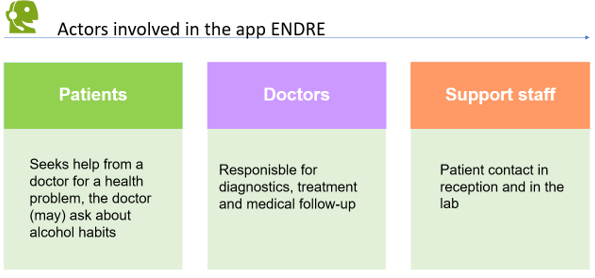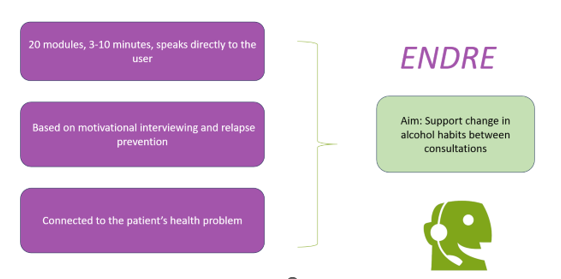Center for alcohol and drug research (KORFOR)
ENDRE 2.0
A program aimed to assist pasients towards behavioural change related to health habits
The intervention was originally developed as a smoking cessation program and its development is previously described in detail (1). It is a web-application designed to be easily accessed and read on small screens, like smart phones. The current version of the program is a theory-based, self-administered e-health intervention to address behavior change and alcohol-related health problems for use in general practice, and it consists of 22 unique modules, which take between 3-10 minutes each to complete. The theoretical basis is mostly drawn from Self Determination Theory, Motivational Interviewing, and relapse prevention.
The main focus of the program is to support behavior change through computerized motivational interviewing to strengthen internalized motivation, and the program is designed to support a working alliance between the user and the program. The intervention thus uses a virtual partner (i.e., a non-embodied relational agent) called “Endre” (a male first name in Norwegian, but also Norwegian for “change”, and the name of the intervention). Endre uses first person tense, asks questions and answers empathically, uses humor, greetings and farewells, “remembers” earlier conversations by referring to them or adjusting program content in accordance with them, and several other alliance supporting elements.

The intervention also entails a component designed to raise patients’ awareness of how their alcohol use may relate to their health problems. As such, Endre is intended as a supplement to how GPs manage the follow-up with patients. This relates to both the treatment of the health problem they visited their doctor for, and the follow-up of a possible alcohol problem, be it follow-up appointments with the GP, referral to other services or medication. The intervention is supposed to be used by patients in their homes, or wherever they roam.

A feasibility-study of Endre in primary care clinics is completed, and a manuscript on implementation aspects is currently under review. Manuscripts on the development of Endre 2.0 and on patient experiences with using Endre will be submitted during 2024.
- Holter MTS, Johansen A, Brendryen H. How a Fully Automated eHealth Program Simulates Three Therapeutic Processes: A Case Study. J Med Internet Res. 2016;18(6):e176. doi: 10.2196/jmir.5415.